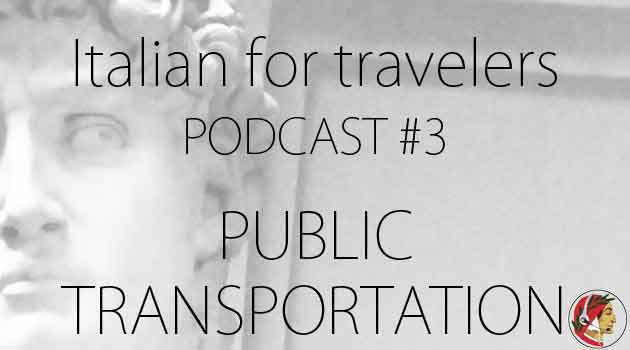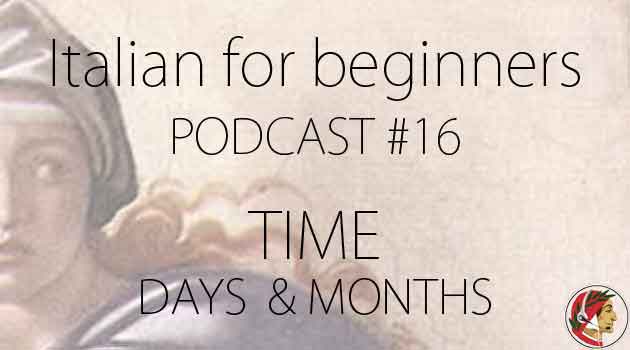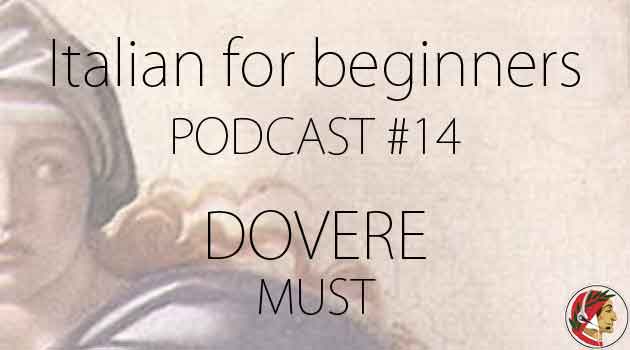LearnsomebasicItalianlanguage aboutpublictransportationandlistentothepodcast.
Allacciatelecinture,siparte.Fastenyourseatbelts…
ThefollowingpodcastIsfree.Ifyouareamemberyoucanreadandlistentothepremiumpodcastatthebottomofthispost. Nothingexotichere…TrainstationsinItalyusuallyhaveaticketcounter(biglietteria)withanoperator(bigliettaio)whocangiveyouinformation(informazioni)aboutyourtrain(iltreno),timetables(orari)theconnection(lacoincidenza).Youcanaskthetimeofdeparture(acheoraparte?)arrival(acheoraarriva?),thedurationofthetrip(quantocimetteiltreno?). Sometimesthetrainislate(iltrenoèinritardo),orthere’sastrike(c’èunosciopero).Loudspeakersatthestationwilltellyouhowlateyourtrainis(“iltrenoperRomaèinritardodi5minuti”),theplatform(ilbinario),ifthetrainisarriving(iltrenoèinarrivo)ordeparting(inpartenza).InformationinlargestationsisbilingualbutlivemessagesfromthestationmasterareusuallyonlyinItalian. Theticket(ilbiglietto)canbeoneway(disolaandata)orroundtrip(andataeritorno).Remembertovalidatetheticket(convalidareilbiglietto)usingtheyellowmachinesonyourplatform.Youcangetafine(prendereunamulta)ifyouforgettodoso.Youmayneedtodoareservation(unaprenotazione)orpayarapidservicefee(supplementorapido)ontopofyourprice. Prettymuchalltrainstationshaveanautomaticticketmachine(biglietteriaautomatica)andyoucanpaywithcash(contanti)oracard(carta).Itisnotunusualtofinditoutoforder(guasta). Busesinbigcities(wesayautobus,corrieraorpullman)areusuallypublic,buttheonescovering longdistancesoftenbelongtoprivatecompanies.Ifyoubuyaurbansingleticket(bigliettosingolourbano)youcanuseallpublictransportationfor alimitedtime. ForexampleinMilano,mycity,withasingleticketyoucantravelanywherefor90minutesfor just1,50euro.ComparedtootherbigEuropeancities,that’sreallycheap. Youcan buyyourticketsinany tobaccostore(tabaccheria),newsstand(edicola)orbusstation.Younormallycan’tbuyticketsonboard,atleastin MilanorRome.Busstops,aswellassubwayortramstopsarecalled fermata;finaldestinationisthe capolinea;timetableistheorario. SomeItaliancitieshavea subway (lametropolitana).Romahas3lines(A,BandthebrandnewCline)(Romahatrelinee);Milanohas4linesandothersunder construction,Napoli2,Catania,Torino,GenovaandBresciahaveasingleline. Inmostcases,thefamousinefficiencyofItalianbureaucracyhasbeenslowingdowntheconstructionofnewmetrolines.Inothercases,likeinRoma,diggingholesinancientcitiesturnedouttobe abigproblem.Monumentsandarchaeologicalareashavebeendiscoveredanditwasnecessarytostoptheconstructionofmetrostationsandlines. Cabs(taxiortassì)aregenerallywhiteoryellow.Youcancallacabthroughtheircustomerservice -theywillsendtheclosestavailable taxi atyouraddress.Ifyoucallthem,themeterwillstartassoonasthedriver(iltassista)getsthecall,butitgenerallytakesjustafewminutes. Alwaysaskthepriceofyourride(quantocostalacorsaper…?)andtoswitchthemeteron(iltassametro)incasethedriver”forgets”todothat.Tipsareuncommon.Taxidriversareofcoursetheright peopleyoucan talktoforunderstandingbetterthecityyouarevisiting. Thisisthebasicsurvivalvocabulary.OurpremiumcontentbelowincludesacompletesetofwebcastdedicatedtotransportationinItaly Ifyouareamember,please Morechaptersarecomingsoon.KeepfollowingusandgetreadyforyourItalianholiday.Pleasesharewithyourfriends.Allaprossima. Whattimeis(bus)48? Publictransport Thebusislate There’sastrikeofpublictransport Where’sthelaststop? Howmuchdoesittaketothestation? Isthereashuttlebustotheairport? WhattineisthenextbusfortheDuomo? Whereistheclosestsubwaystation? CanIhaveatimetable? Whereistheticketmachine? WherecanIpunch? I’dlikeacabat8inDantesquare Howmuchisaridetothestation? Couldyouturnthemeteron? Howmuch(money)isittogototheairport? Pleasekeepthechange



